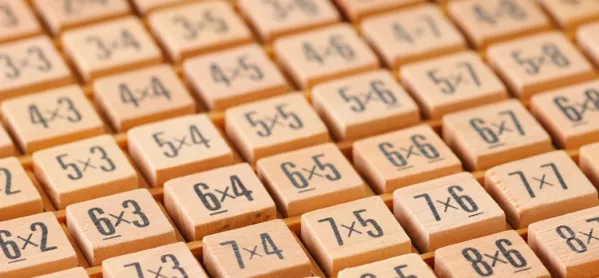The government is to start trialling its multiplication tables check in selected schools from next month, schools standards minister Nick Gibb announced today.
The on-screen test will be sat by eight- and nine-year-olds in Year 4 and is designed to make sure primary school children know their times tables up to 12 by heart.
The trial comes ahead of a national rollout of the check on a voluntary basis from June 2019, before it becomes mandatory in June 2020.
Mr Gibb said: “Just as the phonics screening check helps children who are learning to read, the multiplication tables check will help teachers identify those pupils who require extra support.
“This will ensure that all pupils leave primary school knowing their times tables by heart and able to start secondary school with a secure grasp of fundamental arithmetic as a foundation for mathematics.”
It is understood that a sample of about 290 schools has been selected to participate in the trials, which will involve around 7,250 pupils. The schools are due to receive their invitation to participate shortly.
An expectation that all pupils will know their times tables by heart at the end of primary school has featured in the Conservatives’ past two election manifestos, and last February Mr Gibb confirmed the check would be introduced in 2018-19. The decision to make pupils sit the test in Year 4 follows a consultation on primary assessment held by the government last year.
The government claims the test - which it says will last no longer than five minutes - will “enable teachers to monitor a child’s progress in a consistent and reliable way”.
It insists the check has been “carefully designed to avoid causing additional stress for children and teachers”, and that results will not be published at school-level or used by Ofsted or others to “force changes” in school.
Opposition to times tables test
However, the government has said the check results could be used in discussions with regional schools commisioners about an individual school. And ministers’ decision to press ahead with the test has been criticised by the NAHT heads’ union, which fears the check will be “scrutinised” by Ofsted during school inspections
Nick Brook, the NAHT’s deputy general secretary, said: “We’re working constructively with the government on primary assessment generally, so it’s hugely disappointing that they are still intent on the introduction of a multiplication tables test, which NAHT opposes.
“This test won’t tell teachers and parents anything they don’t already know about their children.
“Although school results won’t be published, this government test will be scrutinised by Ofsted when they visit and therefore become even more significant.
“A pupil’s primary school years are already cluttered with tests and checks. We want all children to succeed at school, but the answer isn’t to test them more.”
The test was welcomed by Mark Lehain, the director of Parents and Teachers for Excellence, a group that campaigns for “knowledge-rich” education.
“These checks are a really worthwhile endeavour,” Mr Lehain said.
“The times tables are a major building block in a child’s mathematical understanding, and becoming fluent in them makes everything so much easier and a lot more fun.”
But the National Numeracy charity urged caution. Chief executive Mike Ellicock said: “While the introduction of this test is underpinned by good intentions, we need to be careful not to knock the joy out of children’s early mathematical experiences or distract schools from building children’s real understanding of numbers.
“Knowing your tables is valuable - we all use them in everyday life - but what is more important is having a real feel for numbers and understanding the patterns behind times tables so children can use the knowledge flexibly in the real world. The danger in putting so much emphasis on tables testing - effectively on rote learning - is that it becomes a box-ticking exercise and hinders the development of practical number sense”
The government said the check is about the consolidation of basic mathematical knowledge and is in line with the principle of maths “mastery” - the pedagogical approach used by locations that top international maths league tables, such as Shanghai and Singapore.
Want to keep up with the latest education news and opinion? Follow Tes on Twitter and like Tes on Facebook





